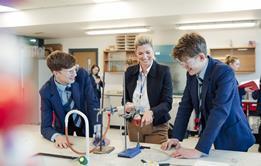Discover how working in groups can be an effective way of actively involving students in their learning, with tips and strategies to use in your lessons

What is group work?
- Students work with other students to share ideas, experiences and views. Effective group work is characterised by talking and listening, often animated. A group might also share workloads, for example in practical or secondary sources research investigations.
- Group size may be from two upwards. Depending on the approach, the group could be the whole class.
- The composition of groups may or may not be chosen by the teacher. Various groupings may be used, from ability to random selection.
- The purpose of the group work must be established before deciding on size and composition.
- Teachers are managers – a vital role. Through effective questioning and prompting they can both lubricate and catalyse the process. They intervene, but without disrupting the flow.
Why use this technique?
- Scientists rarely work alone. Group work is commonplace. The key skills of working with others and communication are integral to group work. They are life skills.
- Sharing, defending and challenging ideas helps students reflect on their learning. During this process:
- Teachers can monitor students’ progress.
- Students are encouraged to use self and peer assessment.
- Students often communicate ideas better with other students than with teachers. They speak the same language and are less afraid of being ‘wrong’. Of course, the vigilant teacher must keep discussions ‘on track’ by effective questioning and prompting.
- Prompting and provoking students to defend an idea can raise emotional involvement and increase students’ engagement. The prompts and provocation may come from teacher or students.
How do I set up a group activity?
Working in teams should be a regular part of science classes. The following guidance is designed to help you use group work effectively in your classroom.
Activities
Be sure that the purpose of the activity is understood by all students. Structure activities and allocate times for tasks. These timings should be adhered to tightly. With younger students, tasks may be around 5–10 minutes. Longer is often not productive.
Older students can participate in more complex activities and take on the responsibility of organising an activity into tasks.
Environment
Try to arrange the physical environment (for example, seating arrangements) to facilitate discussion and exchange of ideas. Just how depends on group sizes and the intended movement of students within and between groups. Teachers need to be able to circulate freely and maintain contact with groups easily.
Group size
- Pairs – this is easy to arrange, non-threatening and quick.
- Small groups (3–4) – this allows more opinions, but is still non-threatening. They may be formed from two pairs combining (the start of ’snowballing’ – see below).
- Large group (5–7) – these enable a greater diversity of ideas, experiences and views.
Group selection
For younger students, choose the group. These may be based on:
- Friendship – non-threatening.
- Ability – easier to match task if students have similar ability; students feel on a par with one another.
- Range of ability.
- Personality – if similar all students may be treated in the same way; if dissimilar the unmotivated may be pulled up by the more motivated.
- Random selection – reflects many workplace situations; broadens students’ experiences.
Other groupings include single sex, equal boy/girl numbers and students with same first language.
Post‑16 students could play an increasing role in selecting and organising groups, for example, sharing roles and responsibilities.
Roles within groups
Help students to choose who will act as spokesperson, researcher, note‑taker, summariser etc.
If ’jig-sawing’ is used (see ’Changing groups’ below) then ‘experts’ within the group are allocated a topic or area of work for which they become the expert and feedback to the team. Again, help groups to allocate roles.
Changing groups
Changing groups adds variety and increases the ideas, experiences and views to which students are exposed.
This can be done by ascribing letters or colours to each group member and then asking them to regroup in matching numbers or colours.
Procedures for changing or mixing groups include:
- Snowballing – two pairs come together to share their ideas and agree an ‘answer’; two of these groups of four come together and again agree an ‘answer’.
- Jig-sawing – each group has its experts in different areas. Experts for a particular topic or area leave their parent group and join together in a new group. They return to their parent groups to share ideas discussed in the expert group. This is quite sophisticated and best used with more experienced students. It requires very careful management.
Bringing it all together
Invite groups to share their work with the whole of the class. If this is by the group spokesperson, ask others if they wish to add anything, question or comment on what they hear. Involve all members of the group in responding to questions.
Alternatively, groups may make formal presentations, especially if the activity was substantial in size.
Where work and responsibilities are shared, build in safeguards to be sure that each member of the group can describe or explain the work of the group as a whole.
Hints and tips for promoting effective group work
- Plan the groups and then the physical layout of the room. Make sure the area is clear of clutter.
- Ensure students know the purpose and outcome of the activity.
- Change groupings regularly, but with a defined purpose.
- Help students to develop the skills they need in group work (consideration for others, listening as well as talking, facing one another, eye contact).
- Keep to set times.
- Think about the questions and prompts to use and avoid giving opinions or ‘correct’ answers too soon.
- Introduce the technique gradually so that skills are developed.
- Make purposeful group work intrinsic to teaching.
- Establish a supportive atmosphere, so that students are comfortable about contributing.
- Decide how long students need to complete the task.
- Ensure the groups that finish first have further activity and do not become disruptive.
- Check the amount and type of work is shared fairly and that, across a number of activities, students experience the full range of roles within a group.
Common issues to watch out for
General
Avoid viewing group work as inconsequential either through fears about loss of control or pressure to deliver the curriculum.
Activities
Check for shared understanding about what is required for each activity.
Environment
Ensure the layout of the room or laboratory is well-suited to the activity.
Group size
- When students work in pairs, they can come to conclusions quickly and without sufficient debate.
- Small groups (3–4) can be affected by social pressures.
- Large groups (5–7) are more difficult to organise physically; it is easier for some students not to participate; social skills are needed.
Group selection
- Groups based on friendship often find it easy to agree.
- Groups based on personality can get labelled and become more demanding if similar. If dissimilar, the motivated may be pulled down by the less motivated.
- Random selection can lead to bad group ‘chemistry’.
Roles within groups
Students sometimes miss out on the full range of roles.
Changing groups
Changes can become chaotic if not managed properly.
Bringing it all together
Feedback can become dominated by just one or two students.
How can I tell if a group activity is successful?
When you devise your checklist to evaluate the session, consider how you will measure:
- How well the students understood the task.
- Whether the student groupings worked as you wished.
- If all students were actively engaged.
- If the students improved their skills to work with others.
- If the students improved their communication skills.
- How meaningful the work in groups was.
- The students’ response to the technique.
- The support for different abilities.
- Whether the work correlated with the objectives.
- Improvement in work standards.
Additional information
This information was originally part of the Assessment for Learning website, published in 2008.
Principles of assessment for learning

Encourage your students to take an active role in their learning using these assessment for learning principles to structure and plan your chemistry lessons.
- 1
 Currently
reading
Currently
reading
Working in groups
- 3
- 4
- 5
- 6
- 7































No comments yet